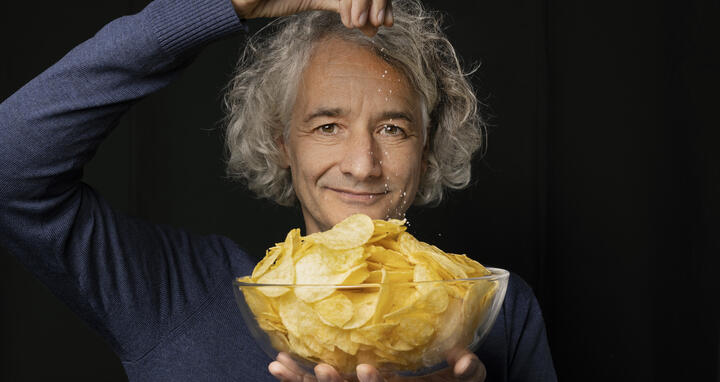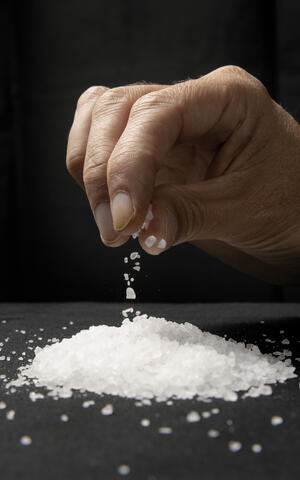The salt scientist
Dominik Müller had had another unusual idea: He’d invited 20 study participants to eat a salty pizza under laboratory conditions. Prior to this, his team had investigated what happens at the molecular level when immune cells receive too much salt: The sodium ions cause the mitochondria to malfunction. Mitochondria are the power plants of our cells and when they stop working properly, they can’t supply as much energy. Müller and his team found the same phenomenon in their pizza-eating study participants.
“But the mitochondria make a full recovery when you stop eating salt,” says Müller. “Eight hours later, the negative effect had subsided.” He’s sitting on the terrace outside his lab at the Experimental and Clinical Research Center (ECRC) at the Berlin-Buch research campus. His gray curls almost reach his shoulders. And his eyes are sparkling at the thought that his pizza idea was a good one.
All about interactions
The body is a highly complex regulatory system and it’s fascinating to see how all the internal processes interact with external factors.
Müller is not a fan of being pigeonholed. He’s someone who enjoys shifting his perspective and transcending boundaries if there’s a chance it will lead somewhere promising. The lab that he and Ralf Dechend lead at the ECRC (a joint institution of the Max Delbrück Center and Charité – Universitätsmedizin Berlin) is called Hypertension-Mediated End-Organ Damage. It focuses on high blood pressure and the damage this causes. For Müller, that’s an invitation to think as broadly as necessary. Which is why he explores what sodium does to our immune cells and how that indirectly impacts blood pressure. “You can’t separate a person into individual parts,” he says. “The body is a highly complex regulatory system and it’s fascinating to see how all the internal processes interact with external factors.”
His team and partners, who come from a wide range of disciplines, have shown that the salt-induced energy shortfall changes the way a type of white blood cell known as monocytes react. In tissues, monocytes transform into macrophages that kill pathogens. The salt made them more effective at doing this. A positive outcome. But in other scenarios, the lack of energy causes too many macrophages to enter the kidneys, which can trigger inflammation and increase the risk of cardiovascular disease.
Whether salt is good or bad depends on the situation. “We try to take a holistic view of these connections – because the salt causes both good and bad reactions,” says Müller, who is also a principal investigator at the German Center for Cardiovascular Research (DZHK). He believes research is never one-dimensional: A mechanism that makes us healthier could eventually lead to disease if it’s activated too strongly for too long – and could potentially be therapeutically blocked once it’s understood well enough.
From blood pressure regulation to the immune system
VMüller’s career path was only mapped out at the beginning. Hailing from the Black Forest, he followed in his pharmacist father’s footsteps and chose a degree in pharmacy, which he earned at Freie Universität Berlin. “My degree gave me a very solid education in the natural sciences. But when I graduated, I knew I had to do something else,” says Müller. When some family friends told him that the Max Delbrück Center had just opened in Berlin, he called up Friedrich C. Luft an, a famous kidney specialist and cardiovascular researcher who is now a scientist emeritus at the Center. “He told me I could start the next day,” says Müller.
And so Müller found himself working among molecular biologists and physicians, researching the renin-angiotensin system, which regulates our blood pressure and the water and sodium levels in our body. “From day one, I was allowed to do my own research and free to work out how I’d make my luck,” he says. He dug into the material and in three years proved that the system was also active in organs – not just in the blood, as was previously thought.
After completing his doctorate, Müller stayed on at the Buch campus. In fact, in the 29 years that have since passed, he has left only once for a temporary professorship at the University of Erlangen-Nürnberg (FAU) – a recommended career move. “Many people have asked me: Why did you never leave?” he says. “My response is: Why would I? I’m at a great institute where I have full freedom.” This freedom has also enabled him to raise four children with his wife in Berlin.
This brought the salt issue, which was previously mainly considered in connection with cardiovascular disease, into immunology.
Müller widened his research focus to include the entire organism – first in animals, and later in humans. “I wanted to understand the mechanisms that lead to high blood pressure and organ damage,” he says. “We eventually arrived at the immune system and discovered that it is massively affected by an excessive inflammatory response.” Based on his findings, he tested various therapeutic approaches to suppress such reactions. In 2013, together with other scientists from the Max Delbrück Center, he founded the company Omeicos, which is developing a drug to combat inflammatory processes in cardiovascular and mitochondrial diseases. The active ingredient is based on substances derived from omega-3 fatty acids and has a heart-protective effect that Müller was able to prove with colleagues at the Max Delbrück Center. “In all my work, I find it very important to stay human-focused,” he says.
Wiener schnitzel and inflammation
The idea to investigate the effects of sodium on the immune system came to Müller as he was tucking into an overly salty schnitzel with a friend of his – a successful immunologist. Could the meal be having a negative impact on the body’s T helper cells?
In 2013, together with researchers from Yale and FAU, he was able to prove that this was indeed the case: excessive salt consumption stimulates T helper cells to produce more of a pro-inflammatory signaling molecule called interleukin-17. This results in, among other things, an increased risk of autoimmune diseases like multiple sclerosis. The study was published in Nature and has been cited across disciplines. “This brought the salt issue, which was previously mainly considered in connection with cardiovascular disease, into immunology.”
Figuring out the impact of salt on the body also led Müller to the microbiome. He and clinician Nicola Wilck decided to work with microbiome researchers to investigate a previously unanswered question: How does salt affect gut bacteria? They found that too much sodium intake reduces the number of certain lactic acid bacteria while increasing the number and activity of T helper cells – and thus also the risk of autoimmune diseases and high blood pressure. A clinical trial is now underway at the ECRC to test the potential therapeutic benefit of lactic acid supplements in people with high blood pressure.
But Müller remained hooked on the microbiome due to its close connection to the immune system and the fact it plays a role in a wide variety of other diseases – including those affecting the heart, kidneys, and blood vessels. He started devoting more and more time to questions of lifestyle: Does fasting have an effect on the intestines and the cardiovascular system? And what is the impact of a high-fiber diet?
He and his team were able to show in mice that propionic acid, which intestinal bacteria obtain from dietary fiber, alleviates damage to the cardiovascular system caused by high blood pressure. The short-chain acid has a calming effect on the T helper cells that fuel inflammatory processes and high blood pressure at the molecular level. Thus, it was shown once again that a common disease like high blood pressure also has an immunological basis and requires holistic research.
Radical thinking as a method
If one steps back and looks at the trajectory of Dominik Müller’s career, one notices it has been characterized by three main principals: taking unexpected paths, crossing boundaries, and questioning everything. He challenges his fellow human beings to think critically. “I think it’s quite justified to question why we have always done certain things a particular way and not completely differently,” he says. He calls this scientific approach “think radical.” For example, he introduced a work-from-home day for his staff long before the Covid-19 pandemic to give them time to think in different surroundings. “For me, an important part of producing research with enduring value is analyzing results in peace before tackling the next task.”
Müller also takes a long-term view of things in general. He is a member of the Sustainability Committee at the Center that works to ensure its research is not only scientifically but also environmentally sound. “I don’t understand how you can separate the two,” he says. “All my research on health only makes sense if there is still a world tomorrow.”
Text: Mirco Lomoth
Weiterführende Informationen







